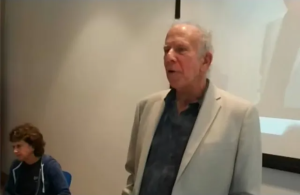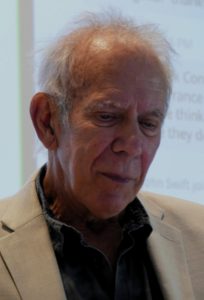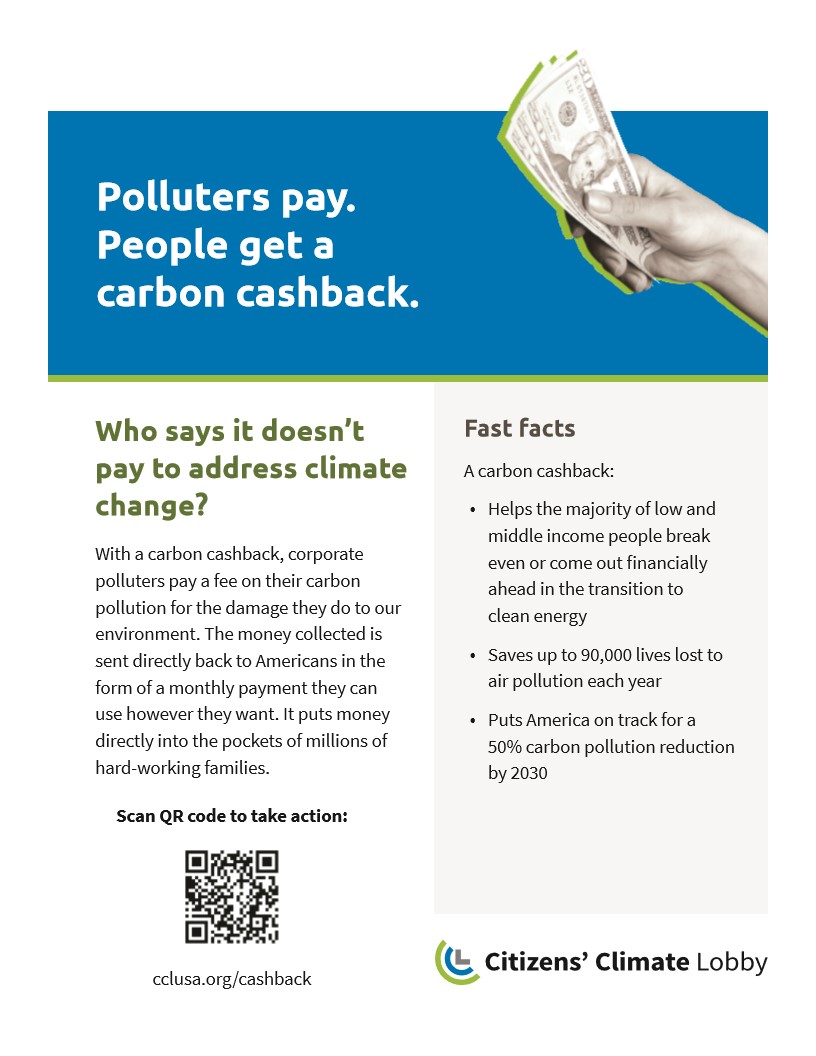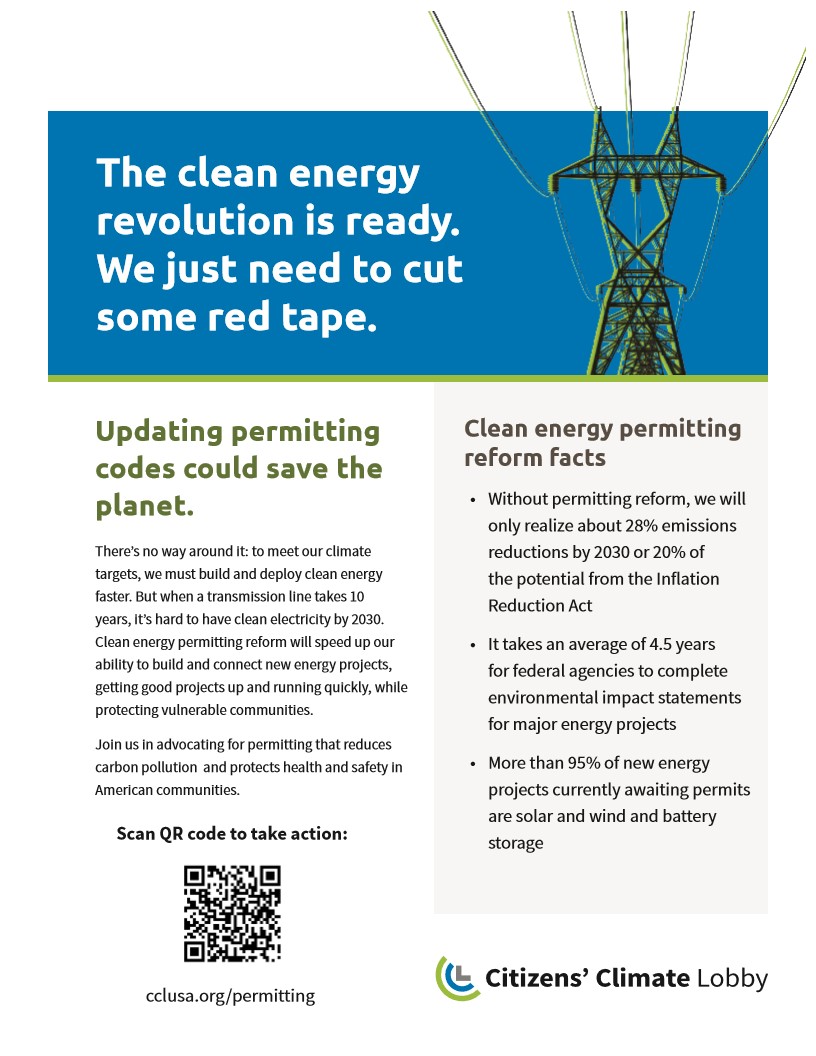By Nancie Silver
 The October 15 meeting featured Jeff Cohlberg, a volunteer for the Citizens’ Climate Lobby (CCL). CCL, a non-partisan organization with 600 chapters in the country, lobbies all members of Congress, and builds support for its agenda in local communities. The policy agenda for CCL focuses on Carbon Pricing, Clean Energy Permitting Reform, Healthy Forests, and Building Electrification and Efficiency.
The October 15 meeting featured Jeff Cohlberg, a volunteer for the Citizens’ Climate Lobby (CCL). CCL, a non-partisan organization with 600 chapters in the country, lobbies all members of Congress, and builds support for its agenda in local communities. The policy agenda for CCL focuses on Carbon Pricing, Clean Energy Permitting Reform, Healthy Forests, and Building Electrification and Efficiency.
Jeff said the Inflation Reduction Act (IRA), which he noted is a big step forward in the fight against climate change, is forecast to bring about a 40% reduction in greenhouse gas emissions by 2030. This will be achieved by offering clean energy tax credits, a methane pollution fee, tax incentives for purchase of electric vehicles, incentives and credits for building electrification and efficiency, direct support of projects involving forests and agriculture, and direct support of clean technology innovation and domestic manufacturing. He said the IRA will transform the US economy in many ways.
CCL supports Carbon Pricing, advocating for a carbon tax and cashback dividend with a carbon border adjustment mechanism (CBAM) to lower emissions and deliver clean energy. The Energy Innovation and Carbon Dividend Act (EICDA) was just reintroduced in Congress; polluters pay, and people get a carbon cashback. Watch the video of the meeting to learn the specifics of this program. There are other carbon pricing approaches besides the EICDA such as the Save our Future Act (SOFA) as well as bills focused on carbon border adjustments.
Jeff introduced the En-ROADS Climate Solutions Simulator, developed by Climate Interactive and the MIT Sloan Sustainability Initiative. It allows users to explore the impact of policies such as electrifying transport, carbon pricing, and improving agricultural practices on many factors such as energy prices, temperature, air quality, and sea level rise. Watch the video to see the different examples he showed during the meeting. Go online and try it out!
Another major area of interest for CCL is Clean Energy Permitting Reform to increase capacity to transmit clean energy and speed up approval of clean energy projects, while respecting the need for community input. Environmental impact reports (EIRs) for clean energy projects can take about four years to complete, and we need to triple our current capacity to transmit clean energy by 2050. Building new long-distance transmission lines takes about ten years to complete. There are some permitting reforms to the National Environmental Policy Act (NEPA) in the debt ceiling bill (Fiscal Responsibility Act). Progressives and conservatives both have wish lists regarding permitting reform. There have been a lot of permitting reform bills submitted in Congress, so hopefully they will find areas in which they can work together.
 CCL works to advance legislation supporting healthy forests, and it educates the public and elected officials on the importance of transitioning to clean energy buildings with electrification and increased efficiency. A reason for hope includes the bipartisan Climate Solutions Caucuses in the House and Senate that were relaunched in July.
CCL works to advance legislation supporting healthy forests, and it educates the public and elected officials on the importance of transitioning to clean energy buildings with electrification and increased efficiency. A reason for hope includes the bipartisan Climate Solutions Caucuses in the House and Senate that were relaunched in July.
CCL is no longer just focusing on national policy; CCL California has been formed to develop strong relationships with the California Senate and Assembly members and their staff. CCL California is lobbying for Al Muratsuchi’s AB 858 Climate Cashback Fund from Cap and Trade. The South Bay Chapter of CCL California is actively involved in lobbying, tabling, speaking at local events, increasing youth outreach, and more.
During the Audience Q & A, Rob Katherman, Director of Water Replenishment District 2, announced a Metropolitan Water District tree planting program in southeastern Los Angeles, and Ann Nye shared some positive environmental news. She mentioned LA Times’ Boiling Point columnist Sammy Roth’s reporting of a coalition to work together to build transmission lines along highways and canals, and highlighted several new bills signed by Governor Newsom. Wally Siembab, SBCCOG Research Director, spoke about some of the obstacles to passing climate legislation and to implementing it, and the lack of urgency to taking climate action. Connie Sullivan reiterated the importance of including the cashback feature in any Carbon Tax legislation, which is why Al Muratsuchi’s AB 858 California Climate Cashback Program needs to pass. Watch the video to hear all the interesting questions and answers discussed.




Leave a Reply